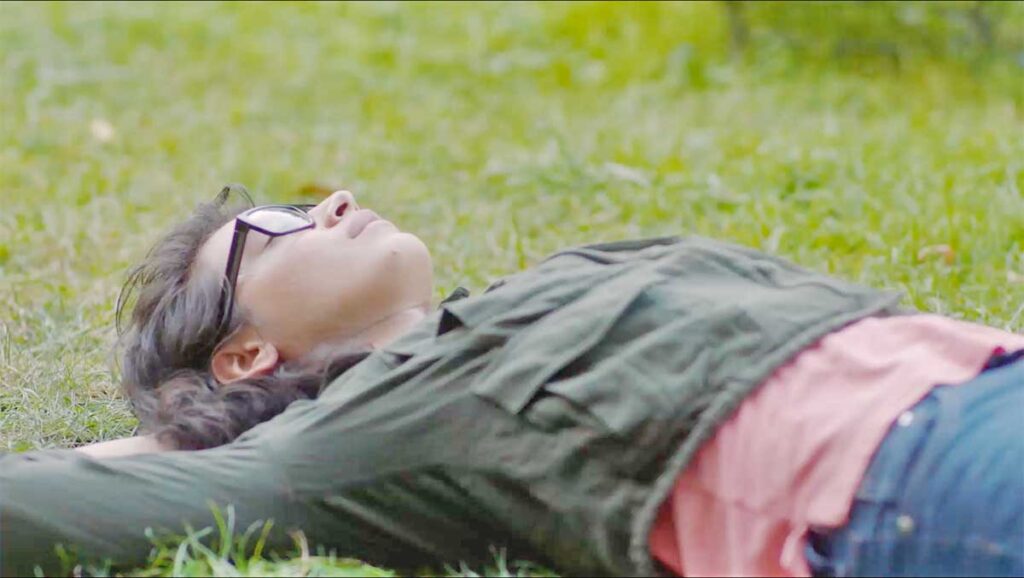“The Garden Left Behind,” the feature debut by director and co-writer Flavio Alves, chronicles Tina’s (Carlie Guevara) efforts to transition from male to female, her budding activism for trans rights, her undocumented status, her personal relationships, and violence against transpeople, in particular transpeople of color. Alves is nothing if not ambitious in tackling so many important social issues in under 90 minutes. The film, which will be available via streaming September 4, won several prizes including an audience award at SXSW in 2019 (denoting it is a crowd-pleaser). But while “The Garden Left Behind” is absorbing, and authentic, and important, it is also frequently didactic.
In a pre-credit sequence, Tina is seen during a pivotal moment in her life. The film, it is later revealed, is a flashback to events leading up to that point in time. As the story begins in earnest, Tina is next seen driving her car, a licensed taxi, and having a new vacuum cleaner delivered to her grandmother Eliana (Miriam Cruz), a kind old woman who longs to return to Mexico and “the garden she left behind.” Details about their migration to the States are vague.
In their New York apartment, Tina brings in the money while Eliana cooks and takes care of the house. Eliana still calls Tina by her birth name, Antonio, but she seems to have no issue with her grandchild’s gender dysphoria. A sweet scene, late in the film, has Eliana seeking guidance from Tina’s friend Amanda (Ivana Black) about Tina’s transitioning. That said, Eliana does have concerns when Tina brings home her boyfriend Jason (Alex Kruz) for sex.
This may be because Tina’s relationship with Jason is one-sided. When they eat out in a restaurant, Tina acknowledges that it is the first time she and Jason have been out in public together. We later find out that they have been together for two years. The sex between them is quite frank. Viewers will likely pick up on the nature of their relationship — Tina’s friends do — even without the discussion of Jason’s refusal to introduce Tina to his family.

If this storyline addresses the “invisibility” of the trans community, Alves does give his trans characters a voice. When Tina’s bestie, Carol (the scene stealing Tamara M. Williams), announces that her friend Rosie was killed by two cops, she mobilizes the local trans community to fight for justice. A speech given at a meeting is rousing, and Tina is moved to become an activist; she even appears on TV. These moments empower Tina, who feels belittled by verbal assaults walking down the street. The points Alves is making are valuable, as is a tender scene between Tina and a speech therapist who helps her with her voice, making sure it is both loud and heard.
But Alves also cudgels viewers with his messaging. When a character gets a haircut, to signal a dramatic life change, the symbolism is heavy-handed. Tina’s undocumented status seems to be raised whenever she needs money, such as a large sum of cash for her doctor’s appointments, because she has no medical insurance. She also pays for a fake green card so she can get on the payroll for a bartending job. Other moments, such as Tina’s conversations about happiness with Dr. Cleary (Ed Asner) — who needs to approve her for treatment — feel contrived. Better are the scenes between Tina and her doctor (Bernadette Quigley) about transitioning and what to expect from the process.
“The Garden Left Behind” also features a subplot involving Chris (Anthony Abdo), a clerk in a local bodega that Tina frequents. When Chris is first seen, he stares at Tina with a look that can be read as fascination, fear, attraction, or repulsion. It’s nicely ambiguous, but as the film follows his character more closely, his interest in Tina becomes more apparent. He calls her but hangs up when she answers. He may be romantically obsessed (he is seen masturbating in the shower apparently thinking of her). Chris does have an odd homoerotic moment with one of his baseball buddies even though he lowers his eyes while they watch porn. But what ultimately transpires between Chris and Tina is not unexpected given the film’s moralizing. Unfortunately, it fails to deliver the dramatic impact Alves desires.
It is a shame the film goes for the obvious, because Carlie Guevara makes Tina so likeable. She exudes charisma hanging out with her trans friends at a birthday party, proving herself a capable bartender, or negotiating with a guy who wants to buy her car. Alves showcases Guevara and all the trans cast members well.
But while Alves should be commended for giving voice to the trans community, his sensitive film might have had more power if he had resisted some of his melodramatic impulses.

